What is high blood pressure (Bp)– High blood pressure, also known as hypertension, is a medical condition in which the force of blood against the walls of the arteries is consistently too high.
Blood pressure is measured using two numbers: systolic pressure and diastolic pressure. The systolic pressure represents the force exerted on the artery walls when the heart beats, while the diastolic pressure represents the force when the heart is at rest between beats.
Normal blood pressure is generally considered to be around 120/80 mmHg (millimeters of mercury) or lower. However, high blood pressure is diagnosed when blood pressure consistently measures 130/80 mmHg or higher over a period of time.
High blood pressure is a significant health concern because it puts strain on the arteries, heart, and other organs. If left uncontrolled, it can lead to serious health problems such as heart disease, stroke, kidney damage, and other complications.
There are two primary types of high blood pressure:
1. Primary (essential) hypertension:
This is the most common type and does not have a specific underlying cause. It develops gradually over time due to a combination of genetic and environmental factors, such as unhealthy lifestyle choices, obesity, lack of physical activity, and stress.
2. Secondary hypertension:
This type of high blood pressure is caused by an underlying medical condition or certain medications. It tends to appear suddenly and can be a result of kidney problems, hormonal disorders, certain medications (e.g., birth control pills), or other health conditions.
Managing high blood pressure typically involves lifestyle modifications and, in some cases, medication.
Lifestyle changes may include adopting a healthy diet (low in sodium and high in fruits, vegetables, and whole grains), engaging in regular physical activity, maintaining a healthy weight, reducing alcohol consumption, quitting smoking, and managing stress.
It’s important to work with a healthcare professional to determine the most appropriate treatment plan for individual circumstances.
How to control high blood pressure in summer
Controlling high blood pressure, also known as hypertension, is essential for maintaining overall health and reducing the risk of cardiovascular complications.
Managing blood pressure during the summer months can present additional challenges due to factors like increased heat, humidity, changes in physical activity, and potential lifestyle shifts. Here are some detailed tips to help you control high blood pressure during the summer:
Stay hydrated: Adequate hydration is crucial for blood pressure regulation. In hot weather, you need to drink plenty of water to replenish lost fluids.
Aim to drink at least 8 cups (64 ounces) of water per day, or more if you are physically active or exposed to excessive heat. Stay away from sugary drinks and excessive caffeine, as they can increase blood pressure.
Limit salt intake: Excessive sodium intake can contribute to high blood pressure. During the summer, when you may be consuming more processed or restaurant foods, be mindful of their sodium content. Opt for fresh, whole foods that are naturally low in sodium.
Read food labels carefully and choose low-sodium or sodium-free options whenever possible. Use herbs, spices, and other flavorings to season your meals instead of salt.
Stay cool: High temperatures and humidity can raise blood pressure. Take steps to stay cool and minimize the effects of heat on your blood pressure. Seek air-conditioned environments whenever possible, especially during the hottest parts of the day.
If you don’t have air conditioning, use fans or seek out public places like libraries or shopping malls that offer cooling relief. Dress in lightweight, breathable clothing and use sun protection measures to prevent overheating.
Manage physical activity: Regular exercise is important for managing blood pressure, but it’s crucial to adapt your activities to the summer heat. Engage in physical activity during cooler parts of the day, such as early morning or evening. If exercising outdoors, choose shaded areas or paths with a breeze.
Modify the intensity and duration of your workouts to suit the weather conditions. Consider water-based activities like swimming, which provide both exercise and natural cooling.
Be mindful of alcohol consumption: Alcohol can have both short-term and long-term effects on blood pressure. Excessive alcohol intake can raise blood pressure and contribute to other health problems
Limit your alcohol consumption to moderate levels, which means up to one drink per day for women and up to two drinks per day for men. If you have hypertension, it’s wise to consult your healthcare provider about alcohol and medication interactions.
Manage stress: Stress can have a significant impact on blood pressure. During the summer, when many people take vacations or engage in leisure activities, it’s important to manage stress effectively.
Find relaxation techniques that work for you, such as deep breathing exercises, meditation, yoga, or engaging in hobbies you enjoy. Take breaks, practice self-care, and ensure you have time for rest and relaxation.
Follow a healthy diet: A well-balanced diet plays a crucial role in blood pressure management. Adopt the Dietary Approaches to Stop Hypertension (DASH) diet, which emphasizes fruits, vegetables, whole grains, lean proteins, and low-fat dairy products.
This eating plan is rich in potassium, magnesium, and fiber, which help lower blood pressure. It also promotes healthy weight management, another essential factor in hypertension control.
Monitor your blood pressure: Regular monitoring of your blood pressure is essential to track changes and evaluate the effectiveness of your management strategies.
Consider investing in a home blood pressure monitor to check your blood pressure regularly. Record your readings and share them with your healthcare provider during check-ups.
Take prescribed medications: If you are on medication for high blood pressure, continue taking it as prescribed by your healthcare provider. Do not make any changes to your medication regimen without consulting them.
Consult your healthcare provider: If you have concerns about managing your blood pressure during the summer or if you experience any unusual symptoms, consult your healthcare provider. They can provide personalized advice and guidance based on your specific health condition.






